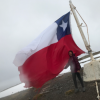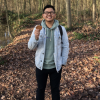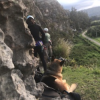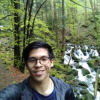Yale-NUS students have many opportunities to study another language abroad. Our Centre for International and Professional Experience (CIPE) manages these programmes:
- Chinese Language Scholarship funded by the Tan Chin Tuan Foundation
- Spanish Language Scholarship
- Summer Language Scholarship
For information on Semester Abroad Programmes, visit CIPE’s website and contact the relevant CIPE advisor.
Where to go for Study Abroad
Language students should talk to their Pre-Major or Major Advisors, their Head of Studies, and the Deputy Director of Language Studies to find out more about prospective places or programmes for study abroad.
Some of the partner institutions that Yale-NUS Language students have pursued foreign language study (and the particular language they studied) include:
- Sciences Po, France (French)
- Universitat Pompeu Fabra, Spain (Spanish)
- School of Oriental and African Studies, UK (Arabic, Persian, Korean)
- Parsons Paris, France (French)
- University of British Columbia, Canada (Chinese)
- Yale University, USA (Chinese)
- University College Utrecht, the Netherlands (Linguistics)
- Pontificia Universidad Catolica de Chile, Chile (Spanish)
- Tel Aviv University International, Israel (Hebrew)
- University of Copenhagen, Denmark (Danish)
- School for International Training Interational Honors Program (IHP) (Arabic)
- SIT Tanzania (Kiswahili)
- Sorbonne University, France (French)
- National Taiwan University, Taiwan (Chinese)
- University of California, Berkeley (Latin)
- Aalto University, Finland (Finnish)
- Yale University (Russian)
For the full list of Yale-NUS partner institutions and to learn more about the study abroad application process and credit transfer process, click here .
Credit Transfer
Students who take language courses during their summer or study abroad programme, can request to transfer these language credits back to Yale-NUS.
Study Abroad Stories
To learn more about the language learning possibilities that come with study abroad, read some of the stories of past Yale-NUS students who went on study abroad to learn a new language and immerse themselves in a new culture:

Celine Liu (Class of 2020)
Pontificia Universidad Católica de Chile, Spring 2019
I studied abroad in Pontificia Universidad Católica de Chile, more commonly know as La Católica. Located in the heart of Santiago, it is a world–class university consistently ranked as one of the best in Chile and Latin America. Students on the exchange programme are treated like regular students and take classes along with the rest of the student body. Classes are conducted entirely in Spanish apart from a handful of paid classes in English. Housing is off campus and unaffiliated with the university. As a result, language learning inevitably became a key component of my life in Santiago. Taking classes in Spanish with local students and living with locals greatly improved my Spanish proficiency in all aspects. Opportunities to speak English were almost non-existent. While this may seem daunting, the university provides good support to foreign students if needed, and the locals are always friendly and accommodating to language learners. I would highly recommend this programme to anyone who is independent and serious about learning Spanish. It will definitely give you an authentic experience of life in a foreign country and language.

Willy Wibamanto (Class of 2020)
Science Po (Paris), Fall 2018
I learnt French in high school for two years and stopped practicing during the break between high school and college. In the midst of losing my competency, I applied for the Summer Language Scholarship and was given the opportunity to attend Sciences Po Summer School in 2017. Studying in Paris made speaking French a daily habit and I soon delved back into the language and gained much appreciation for its historical and literary significance. The 6–week long language program did not only cover grammar, vocabulary and phonetics, but also exposed me to French literature and media. The following year, in Fall 2018, I spent one semester in Sciences Po under the Semester Abroad Programme. Given the opportunity to study in Paris for 5 months allowed me to immerse even deeper into the French culture. Besides taking a French class, I lived off campus and had to settle most housing matters such as electricity and plumbing in French. These experiences challenged me to interact with locals of a different demographic than I was used to, which familiarised me with different slangs and expressions that characterise the area that I live in. By the end of the semester, I had summoned the confidence to speak French while I conducted opinion polls in public, was interviewed for a school production and backpacked to rural parts of the country. There is nothing more helpful than living in the native country to improve your language competency!

Jan Kronauer (Class of 2020)
CET Chinese Program, Summer 2017
During my first summer in Singapore, I was fortunate to have the opportunity to embark on an intensive Chinese summer program in Beijing with CET, a language study provider. Signing a language pledge which required me to speak Chinese every day – except for the first and last three days of my stay – proved incredibly helpful in providing that extra push of discipline. Finding myself in Beijing at the beginning of summer, unable to even ask the cab driver how he was, I took this experience as a sort of personal odyssey. This personal odyssey is therefore one which we cannot fail because every day I speak Chinese to my friends, and every day I study new vocabulary represents an improvement which is valuable and sufficient in itself. Besides my personal ambition to study Chinese, being in China has definitely allowed me to make huge strides towards gaining a better understanding of East Asian culture, history and customs. There is a lot of merit to the saying that language is a window through which we gain access to a country’s culture, and I find this to be especially true for Chinese. My summer study in Beijing allowed me to wander through parks chatting with my new-found Chinese acquaintances or inquire about the goals and dreams of my Chinese teachers. While only one step in a long process, my summer program made me realise the beauty of language, both as an instrument to understand a culture and as a rewarding discipline in and of itself.

Lim Xin Yi, Inez (Class of 2020)
Korea, Summer 2017
During the summer of 2017, I participated in a 4-week long internship and then attended Korean language classes for 6 weeks at Korea University in Seoul. I was constantly using Korean at work, which was at the Asiatic Research Institute of Korea University. My work involved translating texts from Korean to English, and creating an information package for an international seminar. I had the chance to sit in and listen to professors discuss regional issues, such as North Korea’s military threat and China’s One Belt One Road. I was surprised that even before my formal lessons at Korea university started, my Korean language skills had already greatly improved through my increased exposure to the language.

Derek Hum Ming Kai (Class of 2018)
Semester Abroad in Freiburg, Germany (April – July 2017)
Spending my sixth semester abroad in Freiburg was one of the best decisions I made. One of my main goals was to immerse myself in the German language and to improve in it. It was tough – some days I felt like I was improving, and other days like I had made no progress whatsoever. But it was a good kind of challenge. Despite the bad days, I knew I was improving little by little. Learning the language in the formal setting of a classroom is entirely different from speaking it with locals and friends. There are expressions and nuances which you wouldn’t get to learn otherwise. I soon realised that I could understand a church sermon with ease, and spend an entire meal speaking in German comfortably. Besides the language, I gained many insights into German culture, habits, etiquette and ways of thinking. Some certainly struck me as odd and different, but these only helped me to recalibrate my worldview to be that much more open and accommodating.




